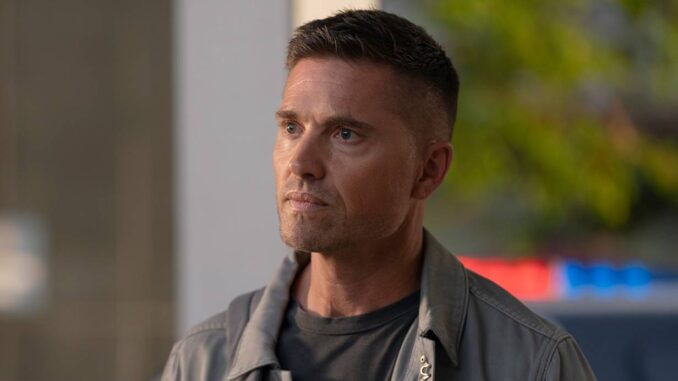
The Unseen Anchor: Why 'The Rookie' Should Bring Back Dr. Blair London
The Rookie has always been a show celebrated for its dynamic character arcs, its ability to weave high-octane police procedural drama with relatable human stories. From rookie mistakes to life-altering triumphs, we've watched John Nolan and his colleagues evolve, stumble, and rise again. Yet, amidst the show's continuous forward momentum, there exists a small, almost forgotten narrative thread from Season 3 – a character whose brief but impactful presence laid a foundational stone for mental well-being that, regrettably, was left unbuilt upon. It's time for The Rookie to remember and bring back Dr. Blair London, Nolan's former therapist, not as a nostalgic Easter egg, but as an essential, grounding force for the entire LAPD unit.
Dr. Blair London, portrayed with measured grace by Camille Guaty, appeared during one of Nolan's darkest periods. After the brutal, emotionally scarring ordeal with Officer Doug Stanton – a truly vile character who gaslit, manipulated, and endangered Nolan, then almost framed him – Nolan was reeling. His faith in himself, his judgment, and even his profession was shaken to its core. This was more than just a bad day at work; it was acute professional trauma. Enter Dr. London, mandated by the department for Nolan's psychological evaluation, but quickly becoming a vital, albeit temporary, anchor.
What made Dr. London's initial appearance so compelling was her role as an objective, non-judgmental confidante. She wasn't a fellow officer, nor a romantic interest; she was a professional who held space for Nolan to unpack the insidious psychological warfare he’d endured. Through their sessions, we saw Nolan, typically the unflappable optimist, grapple with deep-seated anxieties and self-doubt. Dr. London helped him navigate the labyrinthine corridors of his trauma, allowing him to voice the whispered anxieties that a stoic police culture often forces its members to suppress. Her presence normalized therapy, framing it not as a sign of weakness, but as an essential tool for resilience in a demanding, often brutal profession.
Her abrupt departure, once Nolan was "cleared," felt like a missed opportunity even then. While his immediate crisis had passed, the idea that a few sessions could fully inoculate him, or anyone, against the cumulative stress of police work felt a touch naive. But beyond Nolan, the real untapped potential of Dr. London lies in her capacity to serve a broader purpose within the show's narrative.
Consider the landscape of The Rookie today. Every single character has experienced significant, often traumatizing events. Lopez was kidnapped while pregnant. Harper battled the ghosts of her undercover past and the perils of motherhood while on duty. Aaron Thorsen endured being shot and left for dead. Celina Juarez, the newest rookie, grapples not only with the dangers of the job but also a past steeped in psychic phenomena and personal loss. Even Grey and Wesley, often seen as the pillars of stability, face immense ethical quandaries and emotional burdens that chip away at their well-being. The show often depicts the immediate aftermath of these traumas, but rarely delves into the sustained, professional process of healing and maintaining mental health over time.
Bringing back Dr. London wouldn't just be a nod to continuity; it would be a powerful, illustrative statement about the show's commitment to depicting the full spectrum of a police officer's life. She could become the LAPD unit's recurring psychologist, a steady presence for mandatory evaluations, check-ins after critical incidents, or simply a resource officers could voluntarily seek out without the stigma of a "forced" therapy session. Imagine:
- For Aaron: Ongoing support as he physically and psychologically recovers from his near-fatal shooting, navigating the fear of returning to patrol.
- For Lopez: A place to process the lasting effects of her kidnapping and the unique challenges of balancing a high-stress job with motherhood.
- For Celina: Guidance in distinguishing between her intuitive "vibes" and the hard realities of police work, helping her ground her perspective and process the horrors she witnesses.
- For Nolan: A chance for a deeper dive into the long-term impacts of his "rookie" experiences as he ascends to the role of a Training Officer, carrying not just his own burdens but the responsibility for others.
Dr. London could provide the much-needed space for these characters to articulate their struggles, not just to each other, but to a trained professional who can offer strategies, coping mechanisms, and a fresh, objective perspective. It would add a layer of realism and depth, reflecting the growing awareness in real-world law enforcement agencies about the critical importance of mental health services.
In an illustrative essay, it's crucial to show, not just tell. Imagine a scene where Lopez, after a particularly harrowing call involving a child, finds herself unable to sleep, the images replaying in her mind. Instead of just seeing her confide in Wesley, imagine her in Dr. London’s office, articulating the specific weight of the uniform, the feeling of helplessness, the difficulty of compartmentalizing. Dr. London, with a gentle but firm demeanor, could guide her through techniques to process the trauma, illustrating to the audience the how of mental health recovery, not just the what.
Ultimately, bringing back Dr. Blair London is not just about nostalgia for a forgotten character; it's about enriching the narrative, providing a vital resource for its beloved characters, and sending a powerful message to its audience. It's about acknowledging that even the toughest "rookies" and seasoned "veterans" need an anchor, a quiet space where the unseen wounds of their heroic work can finally begin to heal. The Rookie has always dared to be more than just a police show; by reintroducing Dr. London, it can further solidify its legacy as a show that understands the true cost and profound humanity of those who wear the badge.